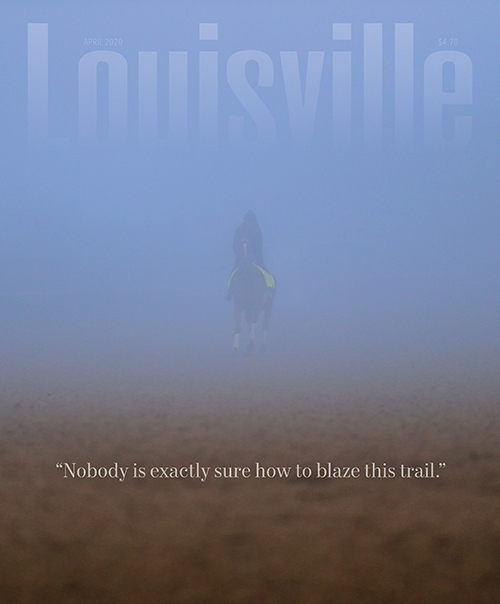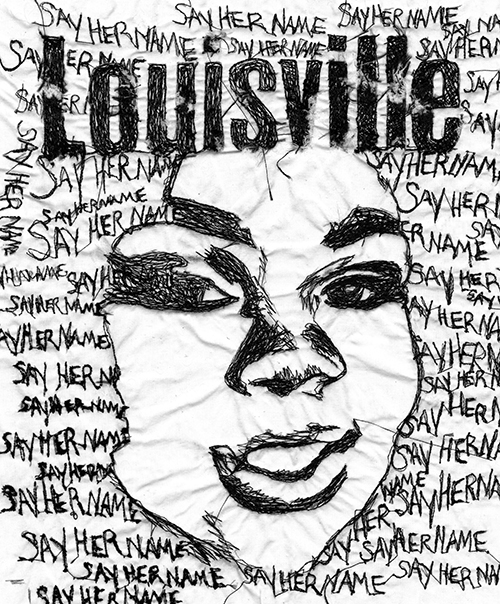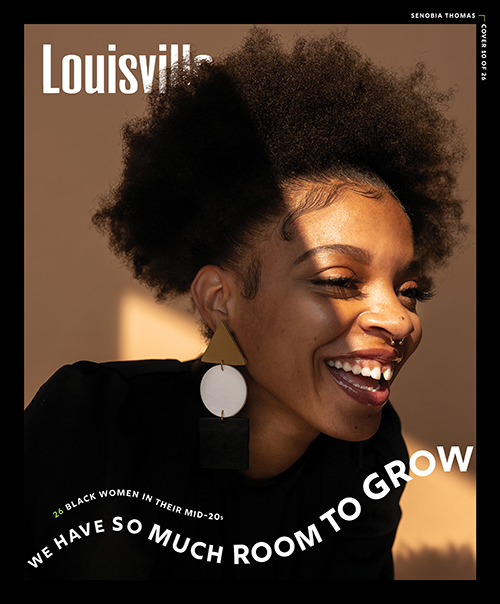The world’s most Louahvul newsletter goes out every Friday. Subscribe at louisville.com/newsletter.
3.26.2021, No. 47
⏱️ = 4-minute read (or so)
“Atchoo!!!” — basically all of us in in-bloom Louisville
FIVE.
1. Last week, I mentioned the looming crush of evictions feared by housing advocates. “Many believe the surge in evictions could end up causing more damage to communities than the 2008 foreclosure crisis,” Anne Marshall, my former colleague, wrote in a Louisville Magazine story last year. In a C-J piece this week, Bailey Loosemore, who has been a must-read on the evictions beat, covered a press conference where “several Metro Council members came together in support of a city-funded program that would pair low-income families with free legal representation in evictions — a move that could keep thousands of renters with children in their homes.” A federal ban on evictions for non-payment is scheduled to end March 31.
2. Our next print issue, out later this month, will feature dozens of old Louisville Magazine covers. Seventy-one total — one from each year since our 1950 founding — with commentary from 71 Louisvillians. Last summer, the magazine included interviews with almost 400 graduating high school seniors, and I recently reached back out to them for, among other things, whatever thoughts came to mind upon seeing this cover from 1965:
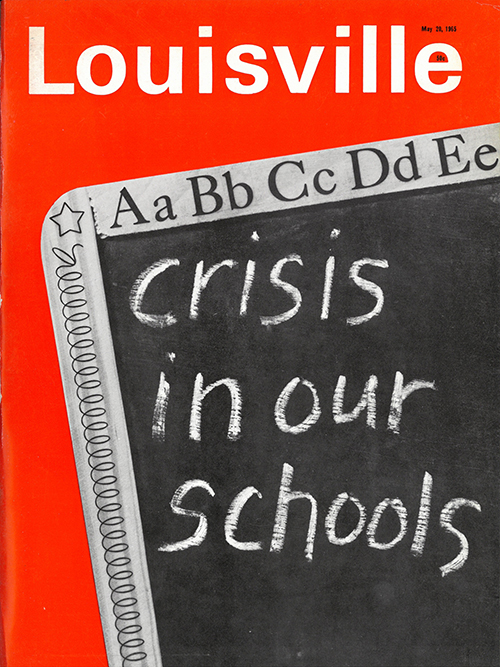
“The pandemic.” — Emily Beach, Ballard grad, Southern Illinois University student
“All of the controversy over whether or not kids should go to school in person or not.” — Kirsten Butler, Manual grad, WKU student
“Obviously the chalk reflects a chalkboard in school, but in schools today we don’t really use chalkboards at all.” — Ruby Osborne, Manual grad, American University student
“The school system has had to adapt to accommodate a new way of learning. It has been challenging for everyone involved, not just students. It is important to recognize the hard work that everyone is contributing to make such uncertain times a little less scary. School allows for the routine that students badly need right now.” — Peyton Stanley, Community Montessori grad, IU student
“I think of my mom, who is a JCPS teacher. I think of all the extra hours she puts in and is still told that she isn’t doing enough.” — Maura Maguire, Presentation Academy grad, JCTC student, working at the Louisville Zoo
“The technological and food disparities happening to students across the city. Many relied on schools to feed them.” — Lian McKernan, Manual grad, Bellarmine student
“The overwhelming use of online school. I feel like people don’t really learn on the computer, so it would make sense that test scores and grades are down.” — Kayden Rapson, Jeffersontown grad, UK student
“Schools never closed. Only the buildings did.” — Tori Minteer, Ballard grad, WKU student
“Crazy to think segregation and Jim Crow happened not that long ago.” — Camden Hardesty, Floyd Central (Floyds Knobs) grad, Indiana State student
“The Academy @ Shawnee, the West End, education inequity.” — Joseph Falcon, Shawnee grad, Centre student
“It makes me feel happy that I’m in college. I get to attend class safely in person. I could not imagine how I would be if I was still doing virtual learning.” — Megan Osting, Sacred Heart grad, Xavier student
“Kids, families and teachers are struggling. We need to get back to in-person classes.” — Lydia Holland, Assumption grad, University of Cincinnati student
“Being in person, teachers can adapt teaching styles to accommodate different students’ needs. Over a video call? Not so easy.” — Aanika Garre, Manual grad, University of Cincinnati student
“The educational crisis is no longer within our schools; it’s beyond them — in our homes, on Zoom, at kitchen tables, in bedrooms.” — Maddie Stokes, Sacred Heart grad, University of Virginia student
3. The C-J and Louisville Business First published obits about Kent Taylor, the Texas Roadhouse founder who died by suicide March 18, after suffering from post-Covid symptoms, including unbearable tinnitus. The Biz First piece ran 10 of Taylor’s quotes from their archive, including my favorite: “When I look at people today, I look at people that maybe aren’t the stars. You want to give the people that aren’t the stars the same kind of attention because they could blossom and become the stars in the future.”
In October 2004, Louisville Magazine published a profile of Taylor, who was 49 at the time. Here’s the opening spread:
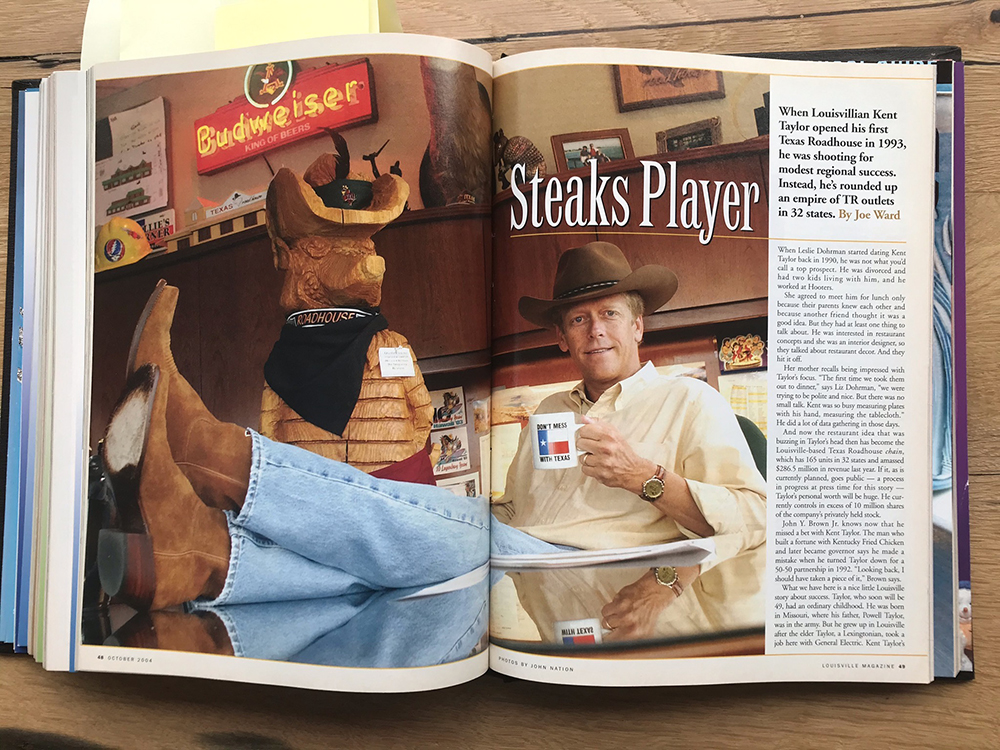
And the opening line: “When Louisvillian Kent Taylor opened his first Texas Roadhouse in 1993, he was shooting for modest regional success.” His company grew from the first restaurant across the river in Clarksville to 611 locations in 49 states, plus 28 international locations in 10 countries.
From the piece: “A Ballard High School cross-country runner, he earned a track scholarship to the University of North Carolina and ran in mile and steeplechase events during track season, and cross-country in the off-season. ‘When you run track that way, you’ve got to go beyond where you think you can go from a standpoint of stamina,’ his mother said.”
Taylor worked at Captain’s Quarters some summers, managed nightclubs and “ultimately also worked for Hooters and KFC in increasingly more responsible jobs.” Taylor’s friend since fourth grade, Frank Buster, told the magazine about how Taylor kept his overflowing ideas “on scraps of various sorts in an old 24-bottle Budweiser case.”
Toward the end of the story, Taylor’s mom said, “I’m extremely proud of him. Mostly because he’s a nice person.”
4. On Monday, the City and Regional Magazine Association nominated Josh Wood’s story “Who Is Vyncex?” for best profile (circulation less than 60,000) in its national awards competition, up against pieces from D (Dallas), Indianapolis Monthly, Sactown and St. Louis. We also received nominations for general excellence, the top award in our circulation group (congrats to the other nominees: Columbus Monthly, Honolulu, Madison and Sonoma), and for cover excellence (congrats to Kansas City, Mpls.St.Paul, St. Louis and Texas Monthly). I’m on an email exchange with several other city mag editors, and they’re always so supportive, especially during the past 12 tumultuous months. On an email chain early into lockdown last March, one of the other editors wrote, “I feel like we’re in a small boat trying to survive a storm, and we have no clue when or if it will end.” This newsletter slow clap goes to all the city and regional magazines throughout the country, telling the stories of the towns they love.
👏…👏 …👏👏…👏👏👏…👏 👏👏👏👏👏👏
Our nominated covers:
And an excerpt from Josh Wood’s Vyncex profile:
There are some things I should mention before we go any further.
The first: Vyncex counts Louisville son Hunter S. Thompson as an inspiration.
Chuck Palahniuk’s novel Fight Club is another.
Both involve very unreliable narrators.
5. Haiku Review
U of L of a Comeback
No Cards in tourney?
Don’t forget the women’s team.
Sweet Sixteen Sunday.
Support for Louisville Magazine comes from Phocus, the caffeinated sparkling water available all over town, including at Heine Bros.’ Coffee, Kroger, Paul’s Fruit Market, Rainbow Blossom, Thorntons, Party Mart, Liquor Barn…and, as anybody who has been to the magazine’s office can attest, the small refrigerator in the kitchen, where cans of Phocus are known to disappear.
OH!
A little something from the LouMag archive.
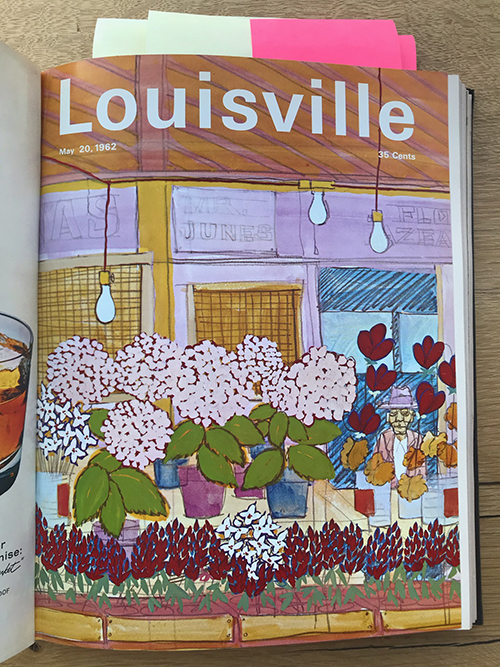
SPRING!!! (Ah, ah, ahhhh…ATCHOOOOOOO!!!!)
This cover, from 1962, depicts “the riotous colors of flowering plants, baskets of fruits and piles of vegetables set against weatherbeaten, tumbledown sheds” at the outdoor Haymarket in its last spring after some eight decades. The Haymarket, on Jefferson Street between Floyd and Brook streets, was a place where, to quote the piece (sorry!): “The well-dressed housewife looking for a bargain rubs elbows with the ragged old woman who counts her pennies carefully before buying two-for-a-nickel bundles of rubber-band-wrapped roots to make that fabled tonic, sassafras tea.”
And to quote a capital-B Businessman in the article: “There’s something down here for everybody — you can buy anything from the best grades to the culls. But anyway, growers need someplace where they can sell their poorer grades of produce and there are people who want to buy it.” (Promise I’m not making up this next part.) “Suppose you had 10 kids and you wanted to buy corn. There’s no sense in you buying the best grade when you can get the ‘nobbies’ for a lot less. And the only difference is that they’re shorter ears — the flavor and the food value’s the same.”
According to the Encyclopedia of Louisville, the “rise of chain groceries” hastened the demise of the Haymarket, our city’s O.G. farmers’ market. From the 1962 LouMag story: “On a bleak winter day, with a cold drizzle falling and the Haymarket nearly deserted, it’s easy to concede that a concrete expressway ramp — or anything else, for that matter — would be an improvement over the ramshackle stalls.” Problem is, I need some of that fabled tonic.
TOO…
I also asked the high school grads to, in one word, name their biggest fear right now, and to do the same for their biggest hope. Here’s some of what they said:
Fears: anxiety, canceled, chance, college, Covid-19, death, division, failing, family, government, isolation, lockdown, loneliness, loss, misunderstanding, mutation, pandemic, repetition, resurgence, stagnation, uncertainty.
Hopes: appreciation, career, change, confidence, connections, dogs, family, friendship, future, happiness, normality, parties, passion, peace, progress, safety, semi-normal, stimulus, strong, summer, togetherness, tomorrow, travel, unity, vaccines.
Josh Moss
editor, Louisville Magazine
josh@louisville.com
Support for Louisville Magazine comes from Kentucky Select Properties, which last week announced the Eleanor Foreman Scholarship, in honor of the woman who integrated the Louisville Board of Realtors by becoming its first Black sales associate in 1963. (She was 94 when she died July 30, 2020.) The scholarship will cover the annual cost for one recipient to: attend real estate school, acquire state licensing, receive a two-year membership to the Greater Louisville Association of Realtors and the National Association of Real Estate Brokers, gain errors and omission insurance, and complete 48 hours of continuing education required of new agents. The recipient will also spend their first two post-license years as a Kentucky Select sales associate. Those interested can apply here.
Read past newsletters here.
